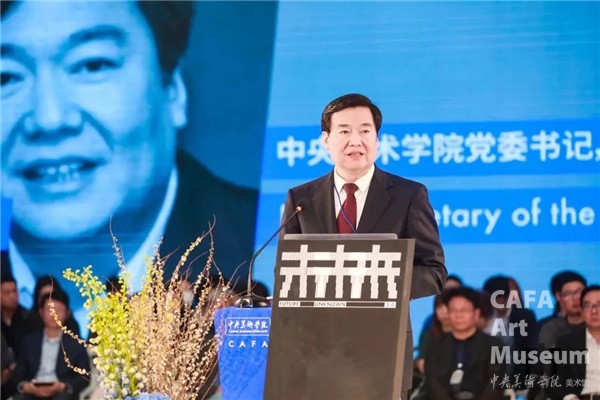





2023年4月1日,2023“未·未来”国际教育论坛在中央美术学院美术馆开幕。教育部党组成员、副部长吴岩为论坛开幕式发来视频致辞,中央美术学院党委书记高洪,中央美术学院院长、中国美术家协会主席范迪安,以及学校领导班子成员、干部师生代表,与来自国内外多个领域的专家学者一同出席开幕式,海外知名学者以视频演讲的方式参加了主旨论坛。论坛邀请到中国文联副主席、中国民协主席、山东工艺美术学院院长潘鲁生,《连线》(Wired)杂志创始主编凯文 · 凯利,美国匹兹堡大学荣休教授许倬云,中国美术学院院长高世名,中国人民大学教授温铁军,华大集团CEO尹烨,英国建筑师和理论家、欧洲科学院院士尼尔 · 里奇,四川美术学院院长、中国美术家协会副主席庞茂琨,物理学家、2017年诺贝尔物理学奖获得者巴里 · 巴里什,鲁迅美术学院院长、中国美术家协会副主席李象群,美国麻省理工学院数学史教授斯拉瓦 · 格罗维奇,广州美术学院院长范勃,威尔士三一圣大卫大学和谐实践讲座教授大卫 · 卡德曼,设计史学者、策展人威廉 · 迈尔斯做主旨演讲。中央美术学院党委书记高洪主持开幕式。

教育部党组成员、副部长吴岩视频致辞
教育部党组成员、副部长吴岩在致辞中表示,党的二十大报告明确提出教育、科技、人才是全面建设社会主义现代化国家的基础性、战略性支撑。吴岩指出,中国高等教育需要加快提质创新,将自身发展的小逻辑、服务经济社会发展的大逻辑,实现教育、科技、人才“三位一体”联动发展。“新文科”建设作为中国高等教育文科教育改革创新的重要突破口,聚焦构建以育人育才为中心的文科教育发展新格局,引领推动理念、标准、内容、模式、技术、方法、评价等全方位全要素改革,努力培养未来的哲学家、社会科学家和文学艺术家。
吴岩强调,艺术教育是“新文科”建设的重要领域,要进一步加快培养引领发展,面向未来的优秀人才,不断提升自主自信的创新力、推动经济发展的服务力、塑造国际合作优势的协同力、实现自身发展的持续力。一是要强化价值引领。树立正确的艺术观和创作观,坚持立足时代、扎根人民、深入生活,以设计为“介”、以艺术为“媒”,创作更多思想精深、艺术精湛、制作精良的优秀作品。二是要深化交叉融合。瞄准经济社会新需求、技术变革新趋势和行业发展新动态,在教学、创作、科研、服务的全过程,激发创新创造活力,推动成果转化。三是要加快数字化转型。革新设计教育观念、内容和方法,推动人工智能、虚拟现实等现代技术的融合应用,用数字技术构建现代艺术教育新体系和艺术创作新路径,掀起一场面向未来的“学习革命”。四是要深化国际交流合作。拓展和深化中外设计教育领域的联合育人、联合科研、联合创作。强化优质资源和高端平台的共建共享,以优秀设计成果促进中外文化交流互鉴,用艺术交流推动构建人类命运共同体。

中央美术学院党委书记、教育部全国高校美育教学指导委员会主任委员高洪主持论坛
中央美术学院党委书记高洪主持论坛,他表示,“未 · 未来”集合全球经济、政治、文化、社会、生态、科学、艺术设计、艺术教育、设计教育等多个领域的专家学者和著名高等院校的研究学者,分享前沿思想,探究创新思维,启迪未来智慧,构建起一个跨文化、跨领域、跨时空的专家汇集、跨界碰撞、多元发声、交流合作的艺术设计教育平台。本次论坛将围绕着新时代艺术设计学科发展的中国路径展开,以期运用全球视野、战略导向、学科融合、系统再造、标准升维等组合策略来培养新时代人才。

中央美术学院院长、中国美术家协会主席范迪安致辞
中央美术学院院长、中国美术家协会主席范迪安以“教育是一种远见”为主题,围绕新时代的中国教育,特别是高等美术教育应如何识别应变与创变的问题进行了阐述。一是超越未见如何达到远见。新文科建设作为中国高等教育文科教育改革创新的重要突破口,需进行全方位要素改革,既要在传统学科中焕发新动力,更要把设计学科的改革作为整个学科结构建构的前沿来推动。二是超越未见如何可能。未来教育要立足时代命题、国家责任,审视教育作为构建时代动力的价值基础和主体价值属性,通过认知动力、决策动力和价值动力,对时代进行认识与洞见,面对、处理甚至超越时代的复杂性。三是如何注入未来远见的教育。就美术教育而言,以技术远见促成学科创新与新知识,以社会远见推动师生走向社会发展的各个现场,以文化远见努力实现传统文化的创造性转换和创新性发展。四是如何在教育中注入美学远见。为学习贯彻习近平总书记给中央美术学院老教授重要回信精神,要坚持以美育人、以文化人、美以成人在美术学府中的落实。

中央美术学院设计学院院长宋协伟致辞
中央美术学院设计学院院长宋协伟向与会嘉宾介绍此次“未 · 未来”国际教育论坛的主题——“超越未见”。他谈到,论坛试图通过对传统教育思维和模式的反思,重新审视教育的新方位,重新塑造教育的新思维,重新探索教育的新方法,并汇聚智慧,建立一个开放的设计教育平台。

会上,范迪安宣布中央美术学院授予温铁军教授(中国人民大学教授,著名“三农”问题专家)、冯雁教授(国际知名学者,香港科技大学电气与电子工程系博士生导师)、佐藤可士和(著名设计师、创意总监)、刘德建(教育学博士,网络游戏研发专家)、尼尔 · 里奇(欧洲科学院院士,建筑师,策展人)、威廉 · 迈尔斯(设计史学家和策展人,《生物设计》作者)为中央美术学院客座教授,并颁发聘书。
论坛邀请到了全球优秀学者、科技实验者、未来预测者、设计研究者、社会学者、商界领导者与国内多所艺术设计院校院长,共同探讨了在人工智能迅速发展的当下,未来设计教育如何与大数据、深度学习、生命科学、生物技术等多类型领域进行广泛的学科交叉,并结合中国语境提出了面向区域特色的学科建设方法和方案。
“主旨论坛”以“教育革命”“人才培养”“生态响应”“艺术科学”“未来福祉”“创新赛道”为分主题,通过对传统教育思想和模式的反思,审视教育的新方位,重塑教育的新思维和新方法,在思维的碰撞中激发面向未来的艺术设计教育思想与超越未见的艺术设计教育思维。本次会议在海内外进行同时直播,首播当天累计观看量13.9万人。






嘉宾合影
|主旨演讲|

凯文 · 凯利
Kevin Kelly
《连线》(Wired)杂志创始主编
凯文 · 凯利认为我们现在正在经历第二次能源革命,不同于第一次革命通过发明人造能源改变了世界,在此轮革命中,我们运用人工智能作为基础能源和算法来预测事物的发展。人工智能作为人类的辅助工具和合作伙伴,在未来需要与人类共同协作发挥各自的优势完成工作。另外,关于人工智能的伦理和情感,凯文 · 凯利也给出回应。他将人工智能与机器人的关系分为四种模式来探讨智能的复杂程度和完整性,当我们思考人工智能和我们将要为人类做什么时,人工智能机器人的最终目的是帮助人类成为更好的人。
高世名
中国美术学院院长
高世名提出人类对于人工智能有了几乎两个世纪的思考,从19世纪以来,人工智能就是科幻小说和各类预言最为钟爱的种子,以至于它占据了人类关于未来的主要想象空间。他认为 AI的发展有多种路径、多种未来,他们本身并不是为了要像人,更不是为了要替代人。19世纪以来的机器人幻想让我们时常忘记了人工智能或者机器人,其实是艺术作品而不是艺术家。而AI对人类的威胁依然来自人的本身,面对人与人工智能关系的审视,高世名院长提出在颠覆性技术变革的背景特别是随着ChatGPT的出现与发展,人类需要重新审视“人”的概念。
许倬云
史学大家
美国匹兹堡大学荣休教授
许倬云从当今青年一代学子的惶恐与不安引出讲述。知识的扩展、科学的颠覆、生活的困惑等共存在这个变化极大的世界,引得人们惶恐难安。看上去我们终于不再饥寒交迫,但这部分的愉快与舒适难抵心理的惊慌与恐惧。
在“天人之际”,无穷之大里的无穷之小,在这中间我们渺小而无助;在“群己之际”,人事网中人我之间的疏离,我们无以慰藉;在“内心的世界”,欢愉与悲痛、决心与成功、失败与灰心、在情和理的世界,我们是否存有坚定的批判与抉择。
环境如此,我们必须面临,在重重阻难中时时刻刻寻觅“前村”。在情趣与智慧、解放与说破、自由与失望中找到舒适与平衡,从苦难中解放出洒脱与豁达,维护但不沉溺于自我的小世界。
温铁军
著名“三农”问题专家
中国人民大学教授
温铁军讲述了他对于社会参与式乡村设计的思考,从反生态的乡村城市化建设到二十大提出的中国式现代化,最终的目标都是要建设以人民为中心的城镇化,人与自然和谐共生,真正实现可持续发展。
为了使城镇化建设与生态达到和谐,一方面提出了要实现全方位、全地域、全过程,以及生态产业化、产业生态化及进一步的生态资本化这两方面来对新的生态资源进行开发;另一方面是对生产关系进行再分配,重构新型集体经济和社会企业作为微观主体。从生产力推进新生产关系的变革,推进乡村振兴战略带动国内大循环为主体的双循环,最终实现共同富裕。在建设中国式现代化的过程中,也需要进行教育的供给侧改革,调整成为我们中国式的教育体系;在实践中将在地的乡土文化与建筑设计的内涵进行有机地整合,推动社会参与式的改造。温铁军教授认为这也是当今“社会设计”学科发展的实践路径。
尹烨
华大集团CEO
尹烨通过探讨回顾基因技术发展的历史引出对于生命科学的思考与基因伦理的反思。他认为“智人”在面对人工智能的威胁下,最为弥足珍贵的是“创造力”。在科技发展速率成指数型增长的当代,我们需要拥抱技术,但却不能被技术裹挟。没有科技的人文或许是愚昧的,但是没有人文的科技一定是危险的。尹烨表示:“我相信人类的代码当中有爱,在人工智能的这个分水岭上,希望我们在最开始的机器人类当中,能把爱和伦理植入进去。我从来不担心硅基会像碳基一样的去思考,我只是担心我们这些自诩为灵长的碳基的生物,像硅基一样去执行。”
尼尔 · 里奇
Neil Leach
英国建筑师和理论家
欧洲科学院院士
尼尔 · 里奇探讨了人工智能对未来设计教学的影响,强调了AI在设计行业中的革命性作用。尼尔 · 里奇还讨论了人工智能对建筑行业的影响,它可以帮助优化建筑性能和效率,然而,它也可能挑战传统观念并导致设计师失业。他认为教育界未来真正的挑战是鼓励学生有效地使用 AI,而不是禁止它的使用。他提倡通过数字平台进行现代教育,并为所有人提供全球资源,不仅仅是少数特权阶层。尼尔 · 里奇已经通过Digital Futures(数字未来)教育平台,正朝着这个方向努力,旨在为学生提供更好的在线教育体验。
庞茂琨
四川美术学院院长
中国美术家协会副主席
庞茂琨的演讲围绕以“艺术设计驱动乡村振兴”与“艺术科技”为主题展开叙事,强调传统技艺和原生文化具有明显的地域性、民族性、多元性和活态性。四川美术学院以坚持大西南、大城乡的生产、生活与生态,并针对文化可持续、绿色可持续两大社会主题,融通问题解决与意义建构。艺术赋能已经成为一种更好参与乡村社会治理和社会创新的变革性手段。设计领域正寻求有效的策略和方法,积极参与到乡村振兴与乡村美育之中,将多学科的知识作为解决复杂问题的工具。当代设计的对象正从产品的系统转向服务系统设计,正在通过自内而外、连接上下的社会创新实践,既是对现有资源创造性的一种重组,也是一种社会资源的粘合剂。在探讨当代艺术理解科技与未来关系之时,所谓的当代绝非是在艺术创作中迷恋新晋出现的科技手段与媒介,而是需要我们自主批判性表达当下人们对科技与未来的情感,或用可见的艺术为前沿科技、科普传播探寻出新的思路和可能。
巴里 · 巴里什
Barry Clark Barish
物理学家
2017年诺贝尔物理学奖获得者
巴里 · 巴里什介绍了牛顿的著作《原理》及研究过程、天体力学之父勒威耶(Urban le Verrier )预测和发现海王星的过程以及爱因斯坦方程式和引力波的提出。根据对引力波的描述,巴里什向大家介绍了他的研究成果(LIGO探测器和引力波观测方面的决定性贡献)。通过探测器对引力波进行观测并得到可视图像,由此我们得以看见“不可见之物”,此项研究的发表使巴里什与他的两位同事在2017年获得了诺贝尔物理学的奖项。
李象群
鲁迅美术学院院长
中国美术家协会副主席
李象群的发言以教育家、艺术家的视野,根据他在国内外的艺术活动谈及三个议题分别是:时空观、文化观和发展观。他提出建立文化个性、国家形象的视觉叙事、构建文化共同体,并解读教育在今天的创新性。
作为国内著名雕塑家,他向大家介绍了鲁迅美术学院共同秉承优秀学术传统创作的艺术案例,先后完成了系列主题大型创作中央党校的雕塑旗帜、中国人民解放军军事博物馆《走向胜利》、《广西湘江战役纪念员》、大型浮雕《红军魂》和党史馆广场上的《追梦》以及《大红兔》等作品。
李象群提出构建文化共同体的同时,更应该提升民族的文化自信,强调教育的创新性和探索性。创作者应具备大历史观,坚持以人民为中心的创作导向,拓展形式和样式,用我们的行动占领我们的时代。
斯拉瓦 · 格罗维奇
Slava Gerovitch
美国麻省理工学院
数学史教授
斯拉瓦 · 格罗维奇列举了诸多人类与机器的隐喻关系,譬如将生命比作熵减过程,将人类比作信息源,将人类交流视为编码信息的传输。
通过诺伯特 · 维纳的“赛博语言”隐喻、巴普洛夫的生理理论、尼古拉斯 · 伯恩斯坦的控制论等学者的理论建构,人机隐喻已成为一个在工程学、生命科学和社会科学之间不断流动的要素。生物体被技术术语所描述,同时技术设备模仿着人体机能,由此,基于新技术感知的身体机制再次诱生新的机器。经由如此循环,人机隐喻被不断地扭转、深化而螺旋上升。
可见,有机体与机械体无法被简单地二分,两者之间的斗争实则是人机隐喻的斗争,而艺术与设计正辅助我们感知隐喻的升维,摒旧创新。
范勃
广州美术学院院长
博士生导师
范勃以“湾区艺术创新系统”为演讲核心主题。该系统是广州美术学院基于当前粤港澳大湾区国家战略以及广东高质量发展的内驱动力开启的新发展路径,是社会创新大系统的重要环节。范勃从系统内部划分出的六个动态创新集群具体探讨,即社会技术创新、艺术科技产业、艺术城乡建设、文化遗产保护、文化创意生活、视觉文化传播。六个创新集群分别聚焦观念、产业、空间、传统、生活与传播,每个创新集群因需求导向而形成兼具人才培养、科研创作、社会服务和文化传承创新职能的独立体,集群之间既相对独立,又动态融汇,因集群间的张力而形成了系统发展的活力。广美希望借助该系统,可以实现教学科研、社会服务、文化传承的有机融合,并探索学校艺术设计教育与国家区域经济社会创新发展路径,打造湾区艺术与科学、设计与产业、教育与社会,面向未来、共享共生、互惠互利的创新系统。
大卫 · 卡德曼
David Cadman
威尔士三一圣大卫大学
和谐实践讲座教授
大卫 · 卡德曼在发表演讲中首先谈到,一切语言及其所产生的一切行为,都是由人们习以为常的潜在价值观所塑造的,再以分享关于“和谐课程”和“关系教育”的两个教育研究案例对未来教育作进一步讨。卡德曼围绕“和谐”和“关系”所基于的根本原则进行展开,他认为人们应该在一个关系式的话语中讨论未来教育,并且使用一种恰当的语言——爱的语言,这种语言在中国的哲学思想“道”论中有所体现。进而就“良善关系”理念下的爱进行阐释,并倡导人与自然和谐共生。最后,卡德曼以其创作的小说片段作为结尾,他说:“爱是一门学科、一门手艺,需要潜心练习......深化你对爱的实践、对静默的实践,因为静默是爱的源泉,是爱生发的地方,但这本身并不足够,因为爱需根植于每个人的内心,而做到这一点的方式就是成为爱。”
威廉 · 迈尔斯
William Myers
设计史学者、策展人
《生物设计》作者
威廉 · 迈尔斯的演讲从其著作中收录的新兴生物设计实践案例开始,展示了一门以生物学作为可持续创新驱动力的开创性学科。迈尔斯在演讲中提出,生物设计的方法论可以分为三类:第一类“With Biology”旨在利用生命创造形式;第二类“For Biology”意味着生物设计优先考虑的不是人类,而是非人类物种和环境空间的改善;第三类“About Biology”则通过设计与艺术批判性反思自然与社会。今天我们的生产制造,是否可以让所有的东西都被充分使用,从生物圈中分解堆肥或直接被回收成新的产品。如果我们都能遵循这些,我们的气候危机将发生明显的、重大的改变。
潘鲁生
中国文联副主席
中国民协主席
山东工艺美术学院院长
潘鲁生的演讲主题为“数字时代的设计之问”。本次主题主要包括五个方面:一是设计教育——设计学院存在的形式;二是温故知新——传统设计的时代价值;三是现实考量——设计面对现实问题;四是智能设计——理论实践综合因素;五是设计自信——中国设计发展展望。
他提出随着信息化、网络化、数字化、人工智能的迅速发展,设计关注的对象更加广泛,信息设计、交互设计,包括智能设计、生态设计、服务设计等新兴的领域不断发展,新的设计问题也值得我们关注。设计作为新兴学科和交叉学科,它与现在的大数据5G模拟现实技术、万物互联、人工智能息息相关。“数字时代的设计之问”是一个社会性、系统性和多样性的问题,需要从经济、社会、文化、教育等各个方面去思考、去回答。
|4月2日主旨论坛|
国务院学位委员会第八届设计学科评议组
第四届全国艺术专业学位研究生教育指导委员会
教育部高等学校设计学类专业教学指导委员会
(与会嘉宾合影留念)
